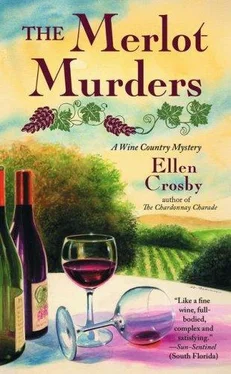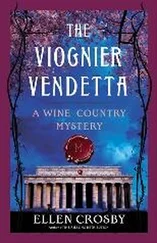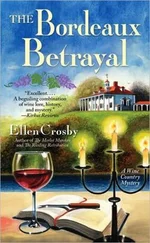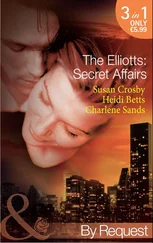“If it was, it isn’t anymore. Somebody’s been through them. They’re—well, I guess you’d call it, incomplete.”
He meant Leland. “My mother kept her own garden journals. Not just what was planted here, but also the flower and vegetable gardens, too. She was very meticulous. I’ll have a look.”
“That’d be good.”
He stuffed his glasses back in his shirt pocket and squatted down, cutting another bunch of grapes from a different vine. “Damnit. Damn crows. And deer.” There were empty spots on several vines along the row where the grapes had been stripped down to the stems.
“Why didn’t you put out the owls?” I asked. My mother had a huge collection of owl statues she put along the fences that surrounded the vineyard. They frightened the birds off. Sort of.”
“Statues? I didn’t know about them. Where are they?”
“The smokehouse. I’m surprised Hector didn’t remember.”
“We’d taken to shooting them. The crows, I mean. Until recently.” He didn’t elaborate. He didn’t have to. “Let’s get some samples from other parts of the block. I’ll do TA and pH back at the house to be sure, but I don’t think it’s going to change anything about when we pick.”
TA is titratable acidity and is a measure of the total acid in the grape juice—pH is sort of related to titratable acidity and is the third important component for determining ripeness. If the pH is too high, the grapes could be overripe. The ideal time to harvest is when there’s a good balance between the sweetness and the acidity in the wine, and that could change in the space of a day.
He started the Gator. “I had a call from Elvis Harmon. Seems our neighbor lost a calf,” he said. “Got through a hole in the electric fence. I promised we’d keep an eye out for it.”
“If it’s been too long the foxes probably got it, poor thing.”
“Or the coyotes.”
“We don’t have coyotes in Virginia.”
“They’re moving into the area. We’ve got coyotes, honey.”
He clipped three more bunches of grapes from other vines in the Chardonnay block, then we headed out into an open field toward the larger of our two apple orchards. Quinn kicked the Gator into third gear and we roared bumpily across the hard-packed terrain.
He slowed down as we came to the orchard with its uneven rows of trees, as pleasantly untidy as the vines were orderly and well trained. Apple-picking time began in September and stretched into October, coinciding with the harvest of our reds. A few men from the vineyard crew were sent to the orchard to pick and the apples were made into sparkling cider.
My mother, like Jefferson, believed in experimenting in the garden, and the orchards had been no exception. We had at least a half dozen kinds of apples—the usual Jonathans, Winesaps, and Red Delicious, but also the more exotic Ginger Golds, Cox’s Orange Pippin, and Jefferson’s own favorite, the Esopus Spitzenburg, which despite its homely name, tasted sweetly and smelled of orange blossoms.
We passed the dry-stacked stone wall at the end of the orchard and drove down an allée of cherry trees my mother had planted as seedlings. My favorite time of year to come to this part of the vineyard was spring, when the sprays of pale pink blooms made it look as though the tree branches were covered in a lace curtain. Some years the blossoms didn’t last long and on windy days there would be a pink blizzard that stripped the trees and left a carpet of petals on the ground.
“When did you start working here?” I asked Quinn.
He smiled. “In time to see these in bloom. They were real pretty. I like dogwoods.”
“They’re cherry trees. You’re in George Washington’s backyard.”
“I thought they were dogwoods.”
“We’ve got dogwoods, too. There’s a grove by the Merlot block. My French mother was very patriotic. It’s our state tree.”
“Ah,” he said. “The Merlot block.”
“That’s where Leland…?”
“Yup.”
“I’d like to see it, please.”
He swung around and we drove back in the direction we’d come from. The Merlot block was nearest to the road, not far from where Sycamore Lane split into a “Y” behind Quinn’s and Hector’s houses. We drove by the dairy barn and the dogwood grove without speaking, but I saw him studying the trees. After a moment he stopped at a post marked “A46, R4” and turned off the motor. All vineyards have a numbering system so it’s possible to keep precise track of the location of a trellis needing repairs, a section of vines with yellowed leaves, or so we’d know where the workers had left off pruning for the day.
There was a small rosebush at the end of the row. It appeared recently planted, and it wasn’t doing well in the heat. There were no blooms.
“Here?” I asked.
“Not right here. In the middle of the row.” He climbed off the Gator and I followed. He wanted to walk, not drive.
Here the rows were about as long as football fields, with the vines planted about three feet apart. We got to the spot and Quinn knelt down, pointing to a section of trellis. “That’s where the vine came down and we had to fix the wires and put in a new post.”
I leaned on my cane and knelt next to him, touching two of the frayed red hay bailing ties on the bottom wire where the vines had broken away. You couldn’t tell anything anymore, except for the newness of the post, which would weather after a couple of seasons. Then there’d be nothing left to physically mark the place where Leland had died.
“Who planted that rosebush?”
“Hector’s wife.”
“I’ll have to thank her.”
“That’d be nice. Hey, are you all right?”
I nodded.
“My old man took off and left my mother before I was born.” He reached over and moved away the canopy of leaves to reveal clusters of Merlot grapes. We were weeks away from picking them, probably not until some time in early October. “I never knew him.”
The sandy loam soil hadn’t compacted yet into concrete where they’d fixed the post and trellis. I picked up a handful and let it run through my fingers. Leland had been around, but I hadn’t really known my father, either.
“Eli said…” I paused.
“Yes?”
“He said there was a lot of blood. Where…?”
He looked uneasy. “There was. I wasn’t sure what to do about it, so I brought one of the coolers and poured water everywhere until it was gone. Kind of returning him to the land, if you know what I mean. It seemed okay, when I thought of it that way.”
“Thank you. That was very thoughtful.”
“You know what was strange?”
“What?”
“I found a bullet here when I did it. I thought it might have been…well, it was old. Really old. It must have been there for years.”
“It could have been from the Civil War,” I said. “We find things all the time. Bullets. Pottery. Even a belt buckle, once, from a Confederate soldier.”
He was silent, then he stood and held out his hand to me. I took it and he pulled me up. “Are you okay?”
“I think so.”
When we got back to the Gator, I poured the rest of my water bottle on Serafina’s rosebush.
He started the motor. “You still want to see those new sites?”
“Yes,” I said. “Let’s go look at the future.”
His mouth curved in a small smile, but he didn’t say anything as he swung around and we drove away.
Highland House is set back more than a mile from Atoka Road, the main road, so much of our vineyard is actually in front of the house, though it’s not evident because we’ve got so much land. My mother and Jacques had planted only twenty-five of our five hundred acres in vines, yielding about five thousand cases of wine a year. In California, twenty-five acres is nothing, but in Virginia it’s a decent-sized vineyard.
Читать дальше












